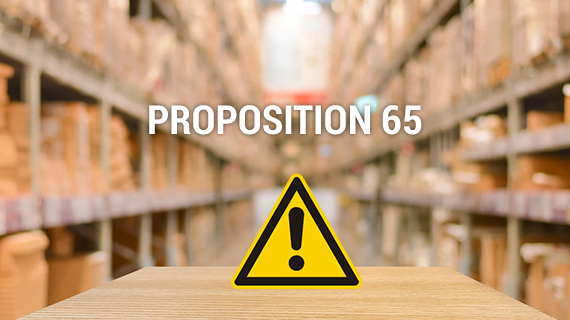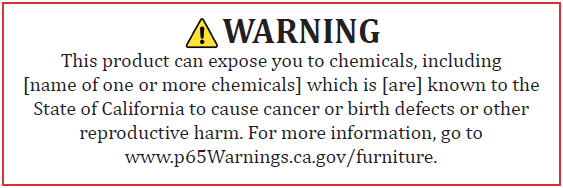
As a distributor, you may have heard about California’s Proposition 65 initiative to protect their citizens by requiring businesses to provide warnings about their products with potentially harmful chemicals. Their goal is to help Californians make informed decisions regarding those products that may expose them to chemicals that cause cancer, birth defects, or other reproductive harm. What began as an intention to educate citizens has now evolved into a full-scale mission to make manufacturers and businesses comply with complex regulations to protect the citizens of California. If you’re a business that doesn’t sell directly to California customers, you may think Prop 65 doesn’t affect you; but you may not realize that the products you sell could still put you at risk. Read on to find out why nearly any distributor could be subject to penalties.
From drinking water to PVC pipe
It all started in 1986, when the state enacted the California Safe Drinking Water and Toxic Enforcement Act to protect the state’s drinking water sources from being contaminated with harmful chemicals. Furthermore, they mandated that businesses provide “safe harbor” warnings alerting people of potentially harmful chemicals in their products. Fast forward to 2016 when then-California Governor Jerry Brown announced a reform of the amendment in an effort to make compliance easier and less burdensome for businesses. In reality, “easier and less burdensome” translated to shifting the responsibility for compliance across the entire supply chain.
With the new regulations in effect since August 30, 2018, Prop 65 now provides more specific warning requirements for manufacturers, demands all warning information be provided throughout the supply chain, and hands out violations based on the location of the potential product exposure – not just where the product was purchased. For example, if someone is cutting PVC pipe at a California job site, Prop 65 says that the people on that job site have an environmental exposure to chemicals that are known to cause cancer and must be made aware of the potential harmful chemicals in the PVC that is being cut. Now that this amendment extends to any Californian who could be exposed to your products, almost any business could be at risk of incurring fines or lawsuits.
Originally, Prop 65 warning labels had to include verbiage saying the product “contains a chemical known to the State of California to cause cancer” or “contains a chemical known to the State of California to cause birth defects or other reproductive harm.” With the extended regulations, California has developed what they call new “clear and reasonable” warnings for businesses to use. The verbiage on these reasonable warning labels has changed from “contains” to “can expose,” and the labels must now include a yellow warning symbol, a specific WARNING identifier, and a link to California Proposition 65’s website.
To further satisfy Prop 65 compliance across the supply chain, businesses must follow additional warning label guidance:
- Warning labels must be located on both food and non-food products
- Any verbiage must be displayed in additional languages to match packaging
- If viewed on any electronic device such as on an eCommerce site, the warnings must display automatically before or during checkout or purchase

The proposition states that if a business does not comply and provide these reasonable warnings on their products and in places that expose people to their list of chemicals deemed harmful to Californians, they can receive penalties as high as $2,500 per violation, per day, per instance.
Little guidance and big gray areas
Unfortunately, California does not provide concrete rules and guidance to help ensure businesses are in compliance. Chances are if you ask other distributors, each one has a different idea of what Prop 65 compliance looks like. And, since the new regulations just went into effect last year, there isn’t any litigation history to set a precedent for compliance either. Without a clear understanding of what constitutes a “reasonable warning,” or where the warnings must be used, the consistency and implementation of Prop 65 compliance runs the gamut across the marketplace.
While manufacturers and retailers struggle to meet California’s complex rules, Orgill Inc. took a decidedly proactive approach to understanding and complying with Proposition 65. In addition to being the world’s largest independent hardware distributor, Orgill also manufactures nearly 8,000 private label items and sells their products in more than 6,000 retail stores around the globe. David Meany, VP of eCommerce at Orgill, says because of their experience as a manufacturer they already had an understanding of the earlier safe harbor rules and knew the potential liability that could come from non-compliance with California. Meany recalls, “Knowing the implications and financial risks involved with Prop 65, we wanted to be ready.”
A distributor’s strategy for compliance
Realizing that their industry as a whole was caught somewhat behind on compliance, Orgill developed a four-prong strategy to help them navigate through the proposition’s requirements and build a solid process whereby they could collect data directly from manufacturers in an efficient, consistent manner that was also easy for vendors.
First, they conferred with legal experts to help interpret the regulations. With their input, Orgill settled on a conservative interpretation for precautionary measures. Next, they developed a compliance strategy based on accountability and legal integrity, which involved ensuring their private label products were tested and compliant, reviewing package labeling, adding compliant warnings to product detail pages and shopping carts on Orgill.com, and identifying outlier products that could be considered special cases. They then built out their compliance capabilities by building a vendor portal and data repository specifically for Proposition 65, implementing system-generated warnings using dynamic algorithms from product data, and creating a supplier onboarding process. The final step of their overall strategy involved putting safeguards in place through compliance monitoring. Now, if the proper declarations and data are not available for an item, Orgill can block the item from their online catalog, or block any shipments.
Meany says by putting the responsibility on the manufacturer, Orgill indemnifies and protects themselves and their retailers. He explains, “We accurately represent the information the manufacturer provides to us and extend it all the way to our dealers so they can properly warn people about any potentially hazardous products.”
Proposition 65 is a complex and demanding law that affects nearly all distributors – even those who don’t sell directly in California – and multiple touchpoints of the supply chain. But Meany maintains that, despite the hurdles, Prop 65 can provide a high-value opportunity for distributors. “Orgill offers value to manufacturers by getting that information to all their end points where they sell product,” he explains. “We also create a common place where a retailer can get a lot of information from one place, rather than have them maintain a relationship with each manufacturer.”
